ReverseProxy for IIS 6.0 in CS using ASP.NET: Difference between revisions
m (→Uninstalling) |
|||
| (8 intermediate revisions by 2 users not shown) | |||
| Line 1: | Line 1: | ||
== Problem to solve == |
== Problem to solve == |
||
We want to embed content from |
We want to embed content from an internal webserver e.g. <code><nowiki>http://foo</nowiki></code> to our public webserver |
||
<code><nowiki>http://sar.informatik.hu- |
<code><nowiki>http://sar.informatik.hu-berlin.de</nowiki></code>. In particular the frontend request |
||
<code><nowiki>http://sar.informatik.hu- |
<code><nowiki>http://sar.informatik.hu-berlin.de/test/bla.html</nowiki></code> should get the response for <code><nowiki>http://foo/dir/bla.html</nowiki></code>. |
||
Thus the mapping is: |
Thus the mapping is: |
||
* <code><nowiki>http://sar.informatik.hu- |
* <code><nowiki>http://sar.informatik.hu-berlin.de/test -> http://foo/dir</nowiki></code>. |
||
From outside this should be look like a local web directory. |
From outside this should be look like a local web directory. |
||
| Line 31: | Line 31: | ||
> }</nowiki> |
> }</nowiki> |
||
</pre> |
</pre> |
||
Complete [[ReverseProxy.cs]] |
Complete [[ReverseProxy.cs]]. |
||
Then redirections which usally occur if you enter e.g. <code><nowiki>http://foo/dir -> http://foo/dir/</nowiki></code> are forwarded to the browser as <code><nowiki>http://sar.informatik.hu- |
Then redirections which usally occur if you enter e.g. <code><nowiki>http://foo/dir -> http://foo/dir/</nowiki></code> are forwarded to the browser as <code><nowiki>http://sar.informatik.hu-berlin.de/test -> http://sar.informatik.hu-berlin.de/test/</nowiki></code> |
||
== Installation == |
== Installation == |
||
| Line 41: | Line 41: | ||
# Create in the IIS MMC a virtual directory [[Image:rproxy_2.png]] |
# Create in the IIS MMC a virtual directory [[Image:rproxy_2.png]] |
||
# Give the alias name under which the resource should be reachable by the frontend <code>test</code> [[Image:rproxy_3.png]] |
# Give the alias name under which the resource should be reachable by the frontend <code>test</code> [[Image:rproxy_3.png]] |
||
# Select the Web Site |
# Select the Web Site Content Directory <code>C:\Inetpub\test_virtual</code> [[Image:rproxy_4.png]] |
||
# OK. [[Image:rproxy_5.png]] |
# OK. [[Image:rproxy_5.png]] |
||
# Check the Properties of the virtual dir. [[Image:rproxy_6.png]] |
# Check the Properties of the virtual dir. [[Image:rproxy_6.png]] |
||
| Line 48: | Line 48: | ||
# Insert [[Image:rproxy_9.png]] |
# Insert [[Image:rproxy_9.png]] |
||
# Enter: Executable <code>C:\WINDOWS\Microsoft.NET\Framework\v1.1.4322\aspnet_isapi.dll</code> and uncheck "Verify that file exists" [[Image:rproxy_10.png]] |
# Enter: Executable <code>C:\WINDOWS\Microsoft.NET\Framework\v1.1.4322\aspnet_isapi.dll</code> and uncheck "Verify that file exists" [[Image:rproxy_10.png]] |
||
# If you |
# If you select <code>.asax</code> and then press Edit it should look like that: [[Image:rproxy_11.png]] |
||
# Open cmd- |
# Open cmd-prompt and to register <code>ICSharpCode.SharpZipLib.dll</code> and run <pre><nowiki>cd C:\Inetpub\test_virtual |
||
<pre><nowiki>cd C:\Inetpub\test_virtual |
|||
C:\Inetpub\test_virtual>C:\WINDOWS\Microsoft.NET\Framework\v1.1.4322\gacutil.exe /i ICSharpCode.SharpZipLib.dll</nowiki></pre> [[Image:rproxy_12.png]] |
C:\Inetpub\test_virtual>C:\WINDOWS\Microsoft.NET\Framework\v1.1.4322\gacutil.exe /i ICSharpCode.SharpZipLib.dll</nowiki></pre> [[Image:rproxy_12.png]] |
||
# |
# Finally you have to configure the proxy by editing <code>C:\Inetpub\test_virtual\Web.config</code><pre><nowiki><?xml version="1.0" encoding="utf-8" ?> |
||
<pre><nowiki><?xml version="1.0" encoding="utf-8" ?> |
|||
<configuration> |
<configuration> |
||
| Line 65: | Line 63: | ||
== Uninstalling == |
== Uninstalling == |
||
* Unregister the gzip- |
* Unregister the gzip-dll by running <code>gacutil /u ICSharpCode.SharpZipLib.dll</code>. |
||
* Remove the virtual directory <code>test</code> in the IIS-MMC. |
* Remove the virtual directory <code>test</code> in the IIS-MMC. |
||
* Remove the directory <code>C:\Inetpub\test_virtual</code>. |
* Remove the directory <code>C:\Inetpub\test_virtual</code>. |
||
--[[User:Wolfm|WM]] 12:54, 13 December 2006 (CET) |
|||
Latest revision as of 11:54, 13 December 2006
Problem to solve
We want to embed content from an internal webserver e.g. http://foo to our public webserver
http://sar.informatik.hu-berlin.de. In particular the frontend request
http://sar.informatik.hu-berlin.de/test/bla.html should get the response for http://foo/dir/bla.html.
Thus the mapping is:
http://sar.informatik.hu-berlin.de/test -> http://foo/dir.
From outside this should be look like a local web directory.
Used Software
IIS Reverse Proxy in particular v1.5.
In that release of software redirections of the backend server are not forwarded transparently to the frontend. Therfore we patched the C-Sharpe code to take care of that. We disabled the internal handling MaximumRedirections = 0; of redirections and send them instead through the frontend to the browser.
The differences are:
38c38
< const int MaximumRedirections = 50;
---
> const int MaximumRedirections = 0;
357a358,370
> switch((int) backEndResponse.StatusCode) {
> case 301:
> case 302:
> case 303:
> case 307:
> frontEndResponse.StatusCode = (int) backEndResponse.StatusCode;
> string newLocation = backEndResponse.Headers["Location"];
> newLocation = Regex.Replace(newLocation, backEndSite,
> frontEndRequest.Url.GetLeftPart(UriPartial.Authority) + frontEndRequest.ApplicationPath,
> RegexOptions.IgnoreCase);
> frontEndResponse.RedirectLocation = newLocation;
> break;
> }
Complete ReverseProxy.cs.
Then redirections which usally occur if you enter e.g. http://foo/dir -> http://foo/dir/ are forwarded to the browser as http://sar.informatik.hu-berlin.de/test -> http://sar.informatik.hu-berlin.de/test/
Installation
Walk through
- Create directory where software lives e.g.
C:\Inetpub\test_virtualand extract archive"\\dc\pub\2006\2006 Software\ReverseProxy_15_SAR.zip"to that directory.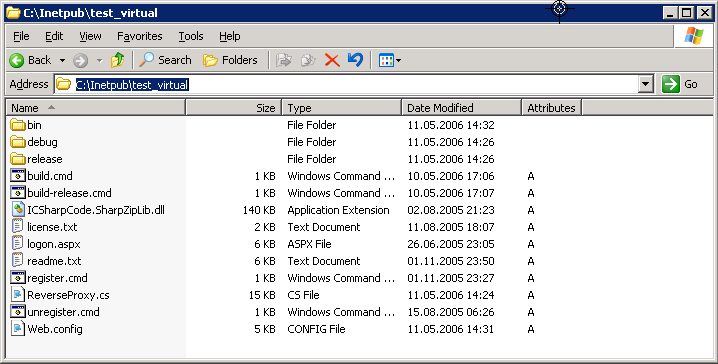
- Create in the IIS MMC a virtual directory
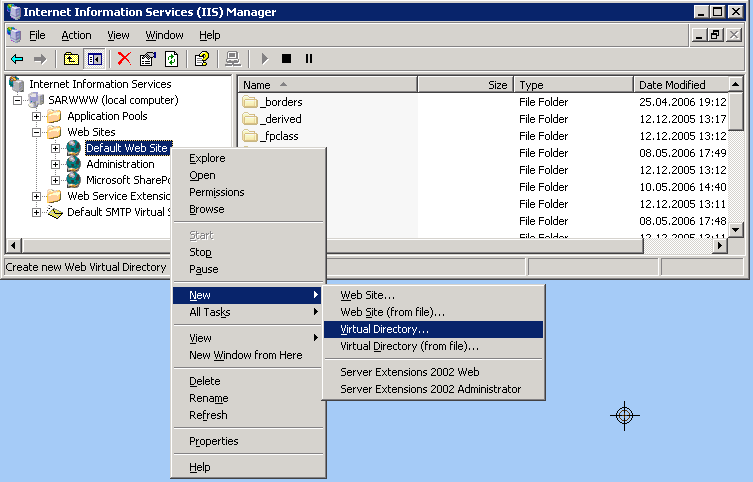
- Give the alias name under which the resource should be reachable by the frontend
test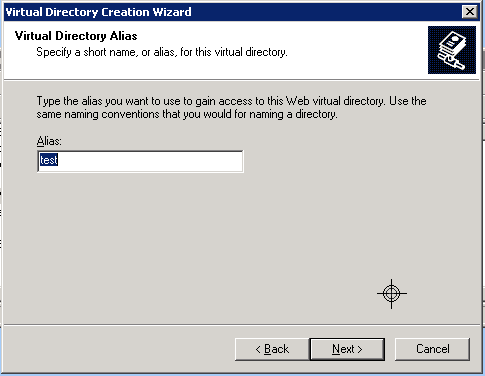
- Select the Web Site Content Directory
C:\Inetpub\test_virtual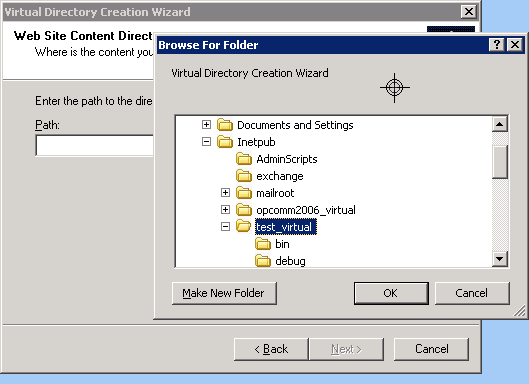
- OK.
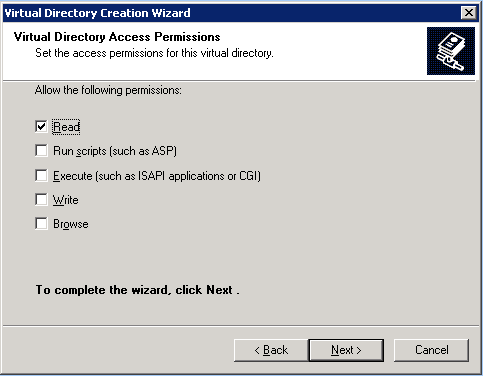
- Check the Properties of the virtual dir.
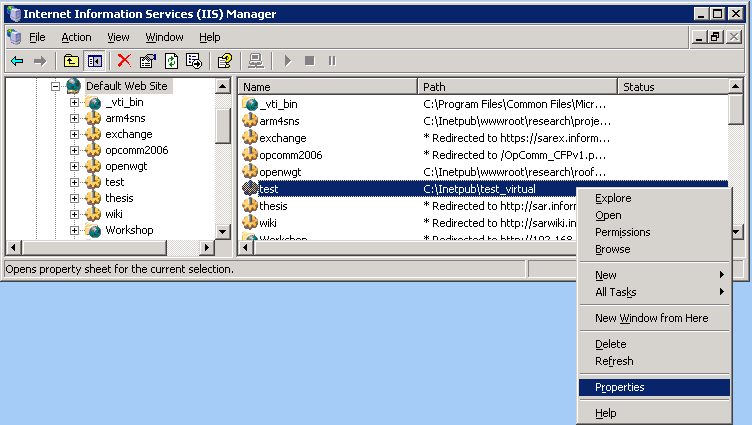
- Press Create.
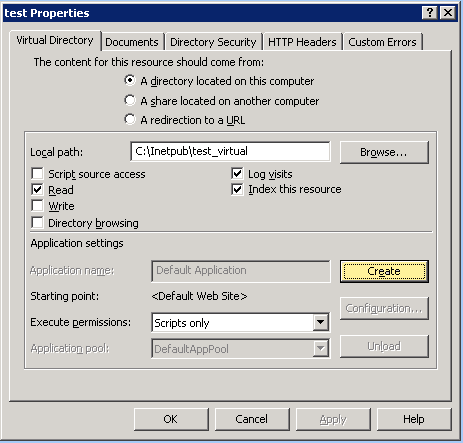
- Press Configuration
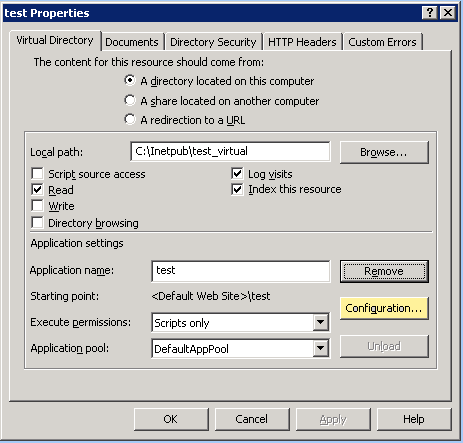
- Insert
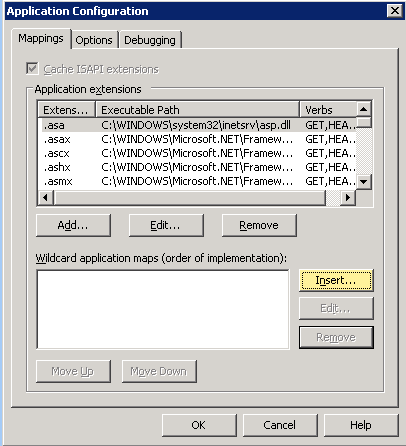
- Enter: Executable
C:\WINDOWS\Microsoft.NET\Framework\v1.1.4322\aspnet_isapi.dlland uncheck "Verify that file exists"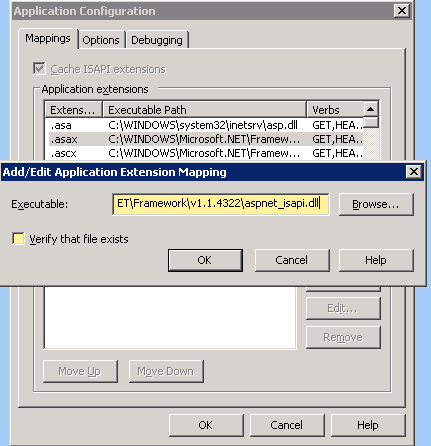
- If you select
.asaxand then press Edit it should look like that: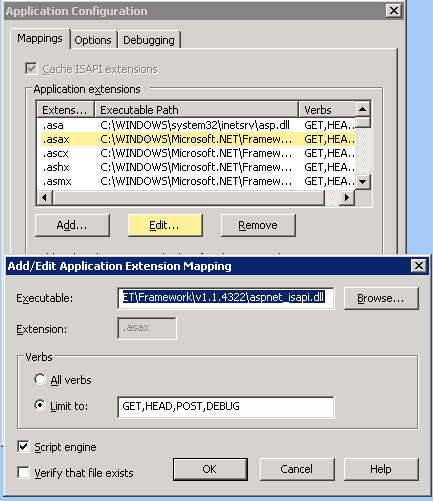
- Open cmd-prompt and to register
ICSharpCode.SharpZipLib.dlland runcd C:\Inetpub\test_virtual
C:\Inetpub\test_virtual>C:\WINDOWS\Microsoft.NET\Framework\v1.1.4322\gacutil.exe /i ICSharpCode.SharpZipLib.dll 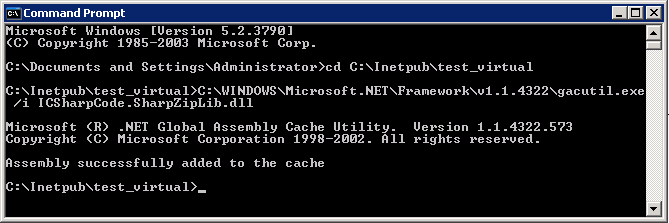
- Finally you have to configure the proxy by editing
C:\Inetpub\test_virtual\Web.config<?xml version="1.0" encoding="utf-8" ?>
<configuration>
<appSettings> <add key="BackEndSite" value="http://foo/dir" /> </appSettings>
<system.web>
...
Uninstalling
- Unregister the gzip-dll by running
gacutil /u ICSharpCode.SharpZipLib.dll. - Remove the virtual directory
testin the IIS-MMC. - Remove the directory
C:\Inetpub\test_virtual.
--WM 12:54, 13 December 2006 (CET)